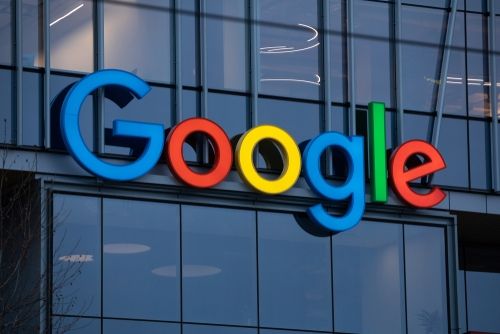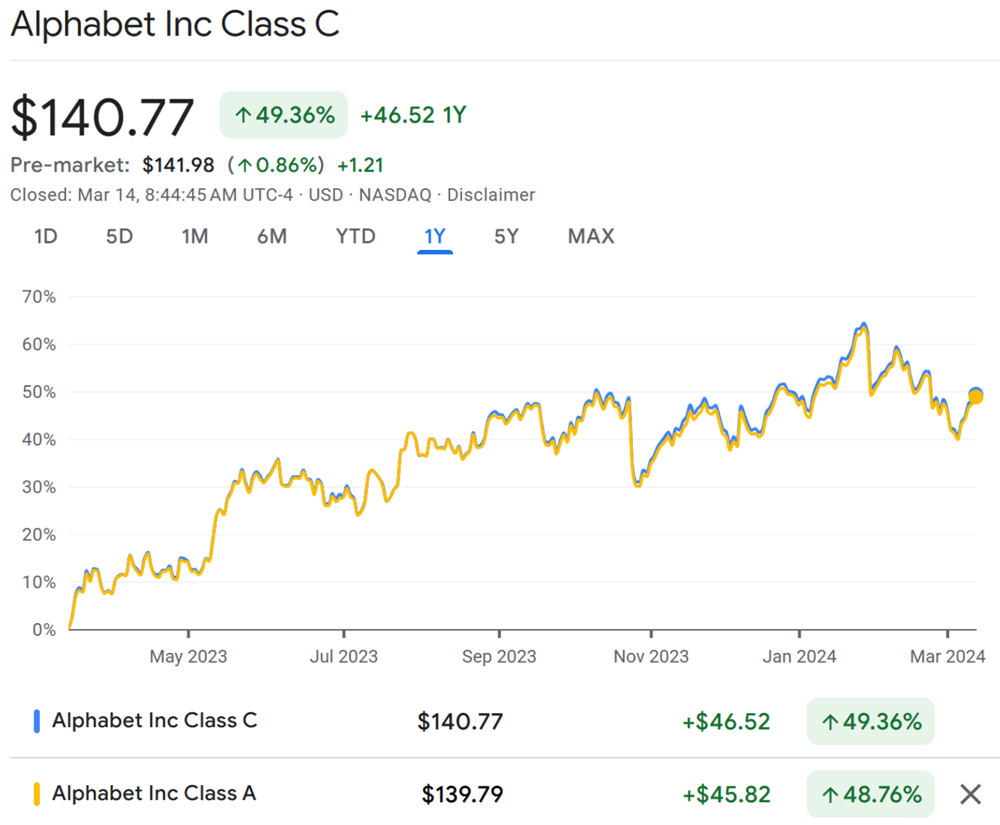
In the dynamic world of stock investments, Alphabet Inc.'s dual-class share structure presents a unique choice for investors: GOOG versus GOOGL. Both represent shares in one of the most innovative and influential companies globally, yet they differ in critical ways that can impact an investor's portfolio.
GOOG shares are Class C stocks that come without voting rights, often appealing to investors who prioritize stock value over corporate influence. On the other hand, GOOGL shares are Class A stocks, granting shareholders voting power and a voice in corporate decisions. This distinction is pivotal when considering which stock aligns with your investment strategy and long-term goals.
As Alphabet continues to expand its reach and develop new technologies, understanding the nuances between GOOG and GOOGL becomes increasingly important. This article delves into the differences between these two types of shares and provides insights to help you make an informed decision regarding which one you should consider for your investment portfolio.
1. GOOG vs GOOGL: Overview
1.1 Alphabet class A vs class C
Alphabet Inc., the parent company of Google, offers two types of stock: Class A (GOOGL) and Class C (GOOG). The primary difference between the two lies in voting rights. Class A shares confer voting rights to shareholders, allowing them to have a say in corporate decisions. On the other hand, Class C shares do not provide any voting rights. This distinction is crucial for investors who wish to have an influence in the company's governance.
From a financial perspective, both share classes typically trade at similar prices, although Class A shares sometimes trade at a slight premium due to their voting privilege. When deciding which one to buy, investors should consider their desire for voting power versus their investment strategy and goals.
1.2 Comparison between GOOG and GOOGL
The only differences between GOOG and GOOGL are price and voting rights.
Table GOOG vs GOOGL
Symbol | GOOG | GOOGL |
Company | Alphabet Inc. (formerly Google) | Alphabet Inc. (formerly Google) |
Capitalization | 1740 Bil. USD | 1740 Bil. USD |
Price (14/3/2024) | 140.77 | 139.79 |
Voting Rights | No voting rights | Voting rights. Each share typically carries one vote. |
ebitda | 25.260 Bil. USD | 25.260 Bil. USD |
P/E ratio | 25.94 | 25.76 |
Perf % YTD | 49.36% | 48.76% |
2. GOOG vs GOOGL: Price change trend
In the dynamic landscape of stock market trends, Alphabet Inc.'s Class C shares (GOOG) and Class A shares (GOOGL) present an intriguing study of subtle differences in investor preferences and stock performance. As of March 2024, GOOG shares have experienced a -5.63% price change over the week, while GOOGL shares have seen a -5.69% change for the same period.
This marginal variance underscores the nuanced interplay between the two share classes, which, despite their similar trajectories, often diverge due to factors such as voting rights associated with GOOGL shares. Historically, GOOGL's stock price has traded at a premium to GOOG, attributed to these voting rights, yet the price difference is typically less than 1 percent of the stock price. In general, arbitrage opportunities tend to equalize these disparities over time, reflecting the market's efficiency in pricing these twin securities.

Historical price comparison: goog vs googl over one year. Source: Google Finance
Alphabet Inc., the parent company of Google, has shown a notable trend in its stock price over the recent period. As of the latest update, the stock symbol GOOG is trading at $140.77, reflecting a positive change of $1.27 or 0.9% from its previous close. This current price positions the stock near its 52-week high of $155.20 and significantly above its 52-week low of $92.78.
The market capitalization stands at an impressive $1.740 trillion, with an average volume of 23,694,891 shares traded. The Price-Earnings (P/E) ratio is currently at 25.94, indicating investor confidence in the company's earnings potential. Despite the absence of a dividend yield, Alphabet Inc.'s robust performance and strategic positioning in the tech industry continue to make it an attractive option for investors looking for growth and stability in their portfolios.
3. How to buy GOOG or GOOGL shares?
To buy these shares, one can follow these steps:
1. Open a brokerage account: Choose a reputable brokerage that aligns with your investment goals and offers access to the NASDAQ where both GOOG and GOOGL are traded.
2. Fund your account: Transfer funds into your brokerage account to make your purchase.
3. Research current market conditions: Analyze the current price, performance history, and market conditions of GOOG and GOOGL.
4. Place an order: Decide on the number of shares you wish to purchase and whether to place a market order (buying at current market price) or a limit order (setting a maximum purchase price).
5. Monitor your investment: Keep track of your investment's performance and the ongoing developments within Alphabet Inc., the parent company of Google.
In Section One, we mentioned the voting rights of Google stocks, which only apply when you purchase the underlying assets of the stocks. When buying some derivatives such as CFDs, you only gain or lose money based on the difference between the buying and selling prices, without any voting rights or stock dividends.
 Mitrade – Award Winning Trading Platform
Mitrade – Award Winning Trading Platform
✅400+ Global financial CFDs
✅ Flexible leverage, instant analysis
✅ $50,000 risk- free virtual money
✅Accessible on multiple devices 24/5
4. GOOG vs GOOGL: Which one should you buy?
In terms of financial performance, both share types have historically moved in tandem, reflecting Alphabet's overall business health. Both represent shares in Alphabet, but there are key differences. GOOGL shares are Class A shares, which confer voting rights to the shareholder, typically one vote per share owned.
On the other hand, GOOG shares are Class C shares and do not have any voting rights. The decision on which to buy depends on the investor's goals. If having a say in company decisions is important, GOOGL might be the preferred choice.
However, if voting rights are not a concern and one is looking for potentially lower-priced shares, GOOG could be more appealing. It's essential to consider the long-term investment strategy and how these stocks fit into it.
5. FAQs
5.1 What about class B stock?
Google’s lesser-known Class B shares deserve attention. Unlike publicly traded shares, these special shares cannot be bought or sold on the stock market. However, they wield significant influence: each Class B share carries ten votes, granting it ten times the voting power of regular GOOGL shares.
The creation of Class B shares in April 2014 was strategic. Google’s founders, Larry Page and Sergey Brin, along with former CEO and chairman Eric Schmidt, designed these distinct share classes to maintain control of the company. Even if their individual ownership fell below 50%, the Class B shares ensured their continued influence over Google’s direction.
These Class B shares serve as a powerful tool for insiders, safeguarding their say in critical decisions while preserving the company’s stability.
5.2 Does having a say in company decisions through voting really matter?
When you invest in GOOGL shares, you're granted the right to vote at shareholder meetings. But for an individual investor, the small number of shares you hold means your voice is hardly heard. This is especially true considering the company's founders and executives hold all class B shares, wielding over 60% of the voting strength. Thus, while it might feel good to have voting privileges, in reality, they don't offer much actual influence.
5.3 Google Stock Split: Why?
Google stock was originally GOOGL, class A shares. This stock has traded on Wall Street since the company's 2004 IPO. Since then, private Class B stock has had more voting power. GOOGL stock grows steadily. However, in 2012, Larry Page and Sergey Brin recognized that GOOGL's pricing may be deterring new investors. One of Wall Street's most expensive equities, GOOGL traded over $650.
Page and Brin intended to lower stock prices without losing voting power. The corporation chose a smart split over a stock issuance. The corporation introduced class C GOOG stock after this split.
5.4 Can traders switch between GOOG and GOOGL?
Alternating between GOOG and GOOGL may incur trading expenses and tax ramifications for traders. It is recommended to seek the guidance of a financial advisor or tax professional prior to implementing such a transition.
5.5 Which is a better long-term investment: GOOG or GOOGL?
Alphabet, one of the world's leading technological corporations, is facing challenges in its main online advertising, search, and YouTube operations. In 2023, Alphabet's first quarter sales was $69.8 billion, up 3% over the same period in 2022. Its net income was $15.05 billion, an 8% decrease from 2022. Its earnings per share (EPS) was $1.17, a 5% decrease from 2022.
Alphabet's outstanding financial performance has helped both GOOG and GOOGL shares, which reflect the same underlying company value. Both classes' share values have climbed dramatically over time, beating the overall market and the majority of their peers. On May 31, 2023, GOOG ended at $123.37 per share, up 123.38% from five years prior.
GOOGL finished at $122.87 a share, a 116.51% increase from five years earlier. However, before you rush out and acquire any share class, you should be informed of some of the dangers and rewards of long-term Alphabet stock investment.
Before making any trading decisions, it is important to equip yourself with sufficient fundamental knowledge, have a comprehensive understanding of market trends, be aware of risks and hidden costs, carefully consider investment targets, level of experience, risk appetite, and seek professional advice if necessary.
Furthermore, the content of this article is solely the author's personal opinion and does not necessarily constitute investment advice. The content of this article is for reference purposes only, and readers should not use this article as a basis for any investment decisions.
Investors should not rely on this information as a substitute for independent judgment or make decisions solely based on this information. It does not constitute any trading activity and does not guarantee any profits in trading.
If you have any inquiries regarding the data, information, or content related to Mitrade in this article, please contact us via email: insights@mitrade.com. The Mitrade team will carefully review the content to continue improving the quality of the article.








